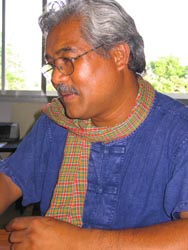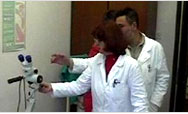You are here » Home » Telling Our Story
First Person
DEPDC offers at-risk
children support and
protection
Protecting Vulnerable Children

| |
Photo:USAID/Suzanne Ross
|
|
“Without DEPDC children
would be fending for
themselves during the day,
leaving them at risk from
being lured, coerced or
forced into an exploitive sex
labor situation,” said
Sampop.
|
Many girls living in Chiang Mai or along Thailand’s border with Burma are vulnerable to sexual exploitation and HIV/AIDS. But
Sompop Jantraka, director of the USAID-supported Development Education Program for Daughters and Communities (DEPDC), believes that if girls are able to attend school or live in a supportive home environment, they can avoid these hazards. With help from teachers, village leaders,
community members, monks, police, medical personnel and
border authorities, Sampop offers protection and support to the
children who are most at risk. Through its emergency shelters
and permanent homes, DEPDC provides children with the
opportunity to attend school, participate in vocational training,
develop life skills and find employment once they graduate.
Over the last 15 years, the USAID-supported outreach has
helped more than 1,000 children.
Of these, 30 beneficiaries — representing ethnic minorities from
Cambodia, Myanmar, Thailand, Laos, Vietnam and China —
expressed their desire to give back to society what they learned
from DEPDC, but they didn’t know how. USAID helped form the
Mekong Youth Net, which trained them to be peer counselors
through lessons on trafficking, human rights, program
management, project development, monitoring, funding and
public relations enabling them to manage satellite efforts in their
home countries. Today, DEPDC beneficiaries work through the
Mekong Youth Net to implement projects and support at-risk
youth.
Print-friendly version of this page (244kb - PDF)
Click here for high-res photo
Back to Top ^ | 

